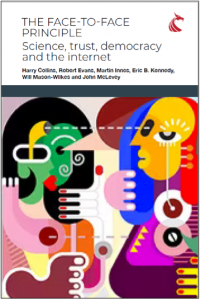
2022: The Face-to-Face Principle: Science, trust, democracy and the internet. Cardiff University Press open access https://doi.org/10.18573/book7 (273 pp)
There are many reasons for scientists to meet face-to-face in small groups as they do their research. They need to transfer tacit knowledge, they need to build trust, they need to develop a new common practice language so they can divide their practical labour but still coordinate it, they need to express commitment through the inconvenience of travel, they need to build new collaborations or supervisory relationships, they need to develop novel forms of life which cross-cut traditional cultures. All this is contrasted with the way the internet works. The internet can easily disguise distant or malign actors as local and faithful partners. The potentially disastrous effect of social media on science and on the development of society is set out in the context of Trumpism.

2019: Experts and the Will of the People: Society, Populism and Science. Palgrave Macmillan (99 pp)
Populism is defined by its contrast with pluralist democracy. Populists define the result of an election as revealing ‘the will of the people’ with anyone who continues to support a losing view as traitorous. Pluralist democracies safeguard the rights of election losers by respecting the limits imposed on government by institutionalised checks and balances such as votes in parliament, a ‘loyal opposition’, alternative chambers, the judicial system, and a free press. All of these depend on experts so experts cannot be an elite in tension with democracy. It is argued that science is another check and balance, ensuring that governments cannot claim whatever they like about the workings of the natural and social world. Populist leaders, therefore find scientific expertise a threat and tend to discount it. We argue that the social studies of science must recognise this and find new ways to justify science.
 2019: Forms of Life: The method and meaning of sociology MIT Press (186 pp)
2019: Forms of Life: The method and meaning of sociology MIT Press (186 pp)
This book is based on 35 previous publications and Collins’s nearly half-century of research experience. It describes sociology as the study of forms of life, or collectivities, the three basic elements of method being immersion in society, reflection on society and explanation to those who have not been immersed. A new approach known as the ‘retrospective reconstruction of method method’ (RRoMM) is described, reflecting the need to stay ‘light on one’s feet’ and sometimes rethink method in the light of scientific instinct and experience. The idea of ‘uniformity’ and the contrast between ‘inferential and tangible’ experiments and observations are examples. The book provides practical guidelines for how to do fieldwork and finishes with a description of how not to do it.
 2018: Artifictional Intelligence: Against humanity’s surrender to computers Polity press (239pp)
2018: Artifictional Intelligence: Against humanity’s surrender to computers Polity press (239pp)
This is the third book analysing and explaining artificial intelligence, the earlier two being published in the 1990s. This book deals with the huge success of deep learning. Deep learning meets, in part, the need, explained in the earlier books, for computers to be embedded into human society if they are to reproduce human-like intelligence; deep learning machines are connected to the internet and so keep up with some changing social behaviours in useful ways. The remaining limits are explained and examples are given of how even deep learning machines fail trivially when given demanding language-handling tasks.
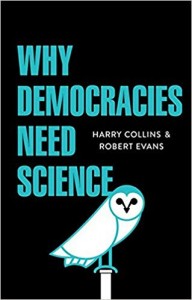
2017: Why Democracies Need Science Polity Press (194pp)
It is claimed that science is valuable to democracies; the treatment is more technical than Are we all scientific experts now? Though the first draft was completed a few years ago, the criticisms of populism are especially timely in 2017. The argument is that the institutions of Western democracies are being eroded by greed under free-market capitalism while science, for which the search for truth is quintessential, has a chance of resisting the pressure and giving society a lead on how to live as scientific values overlap with those of democracy. Also, a committee of ‘Owls’ is proposed with natural scientists and social scientists working together to report to policy-makers on the substance and strength of scientific consensus in respect of pressing technical matters.
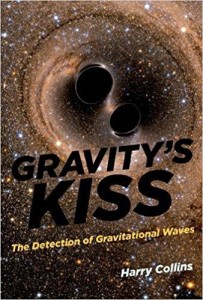
2017: Gravity’s Kiss: The Discovery of Gravitational Waves MIT Press (408pp)
A real-time account of the momentous discovery of gravitational waves beginning a couple of hours after the first intimations of the discovery on September 14th, 2015, 100 years after Einstein proposed their existence, 50 years after experiments began and 43 years after my research started. The story continues through the press conferences in February 2016, the presentation to the American Physical Society, and the public reception of the event. The way the scientists come to their decision and the way rumours were fought off is described. The scientists are criticised for being too secretive and the author’s competence in gravitational wave physics is empirically investigated.
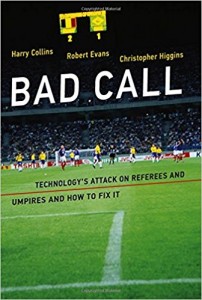
2016: Bad Call: Technology’s Attack on Umpires and Referees and How to Fix It. MIT Press (284pp)
A one-off book which brings together a series of papers by the authors on sports decision technologies and add some new analysis. The philosophy of umpiring is worked out and the faults and inaccuracies of over-complicated technologies are explained. Simple television replays are recommended. The probable and rather different outcome of the English Football Premier League over three season is explained should the authors’ ideas have been in use.
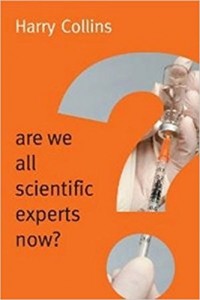
2014: Are We All Scientific Experts Now? Polity Press (144pp)
A quasi-popular book, it tells the story of the collapse of confidence in science, starting at the high point just after the Second World War and working through to post-modernism and vaccine revolts; academic change is interpreted as a reflection of social change. The question is asked: what kind of society do we want to live in? It is suggested that, if we were all treated equal as far as scientific knowledge is concerned, what was counted as true would depend on who was powerful and/or who had most media presence. The result would be a dystopia.
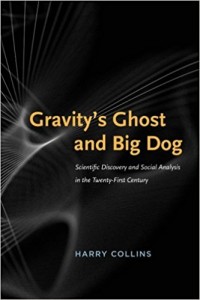
2013: Gravity’s Ghost and Big Dog: Scientific Discovery and Social Analysis in the Twenty-First Century University of Chicago Press (377pp)
This book is the paperback edition of Gravity’s Ghost but also tells the tale of a second, more impressive, blind injection, known as ‘Big Dog’, since its putative source was the constellation Canis Major. In many ways the story is similar to that of The Equinox Event but because the signal was so much stronger this exercise went all the way through to the completion of a paper for publication. Many more technical details are explored here, most notably the argument over the so-called ‘Little Dogs’ which a special kind of false signal that give rise to an intriguing philosophical enigma. The scientists’ conclusions are show to rest on 25 philosophical assumptions. A concluding chapter analyses different kinds of research in the social science in a novel way.
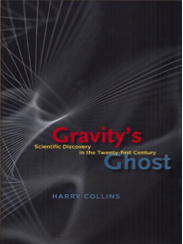
2011: Gravity’s Ghost: Scientific Discovery in the Twenty-First Century University of Chicago Press
Told in the style of detective story – a `whotwosit’ – the book follows the 18 month career of `The Equinox Event – a simultaneous burst of energy on the two giant LIGO interferometers in September 2007 – at about the time of the autumn equinox. The author recorded the argument about the significance of the event as a trusted insider. The book uncovers the nature of scientific discovery and of statistical analysis. The final `Envoi’ consider the leadership role of science in the 21st Century
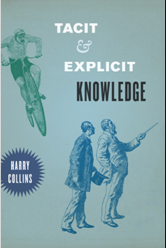
2010: Tacit and Explicit Knowledge University of Chicago Press
Tacit knowledge is three different kinds of thing. Relational tacit knowledge (RTK) is knowledge that is not expressed in explicit form as a result of contingent social arrangements. Somatic tacit knowledge (STK) is located in the practised body and brain. Collective tacit knowledge (CTK) is located in society and humans (and only humans) merely `borrow it’. It is only CTK which is truly impenetrable. Humans’ unique relationship to CTK gives rise to `Social Cartesianism’. The first part of the book tries to explain the difficult idea of the explicit.
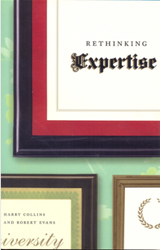
2007: Rethinking Expertise (with Robert Evans) University of Chicago Press
Ideas first set out in Collins and Evans’s 2002 paper, `The Third Wave of Science Studies’ are consolidated. The `Periodic Table of Expertises’ is meant to be an exhaustive listing of ways of being an expert in a technological domain; `meta-expertises’ are used to judge between experts. The idea of interactional expertise is developed and explored along with the Imitation Game for testing it. The final chapter concerns demarcation of science and a new criterion, the locus of legitimate interpretation, is proposed.
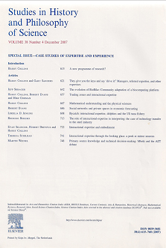
2007: Case Studies of Expertise and Experience Special Issue of SHPS v38 no 4 pps 614-760
Contains ten papers and an Introduction setting out the new programme. Papers cover: interdisciplinarity; interactional expertise and management; use of mathematics in physics; economic forecasting; communication among biologists; technology in tuna fishing; mirror neurons and interactional expertise; South African AIDS prevention policy; and the philosophical consequences of the idea of interactional expertise on the philosophy of embodiment.
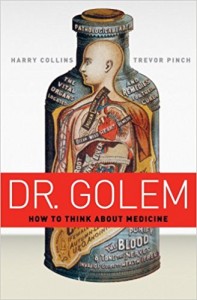 2005: Dr Golem: How to think about medicine (with Trevor Pinch) University of Chicago Press (246pp)
2005: Dr Golem: How to think about medicine (with Trevor Pinch) University of Chicago Press (246pp)
Dr Golem, continues the tradition of Introduction, Conclusion and case studies. These cover the placebo effect and double-blind testing; bogus doctors; alternative therapies; AIDS treatments; tonsillitis fashions, fashionable diseases, effectiveness of CPR and vaccination, where the authors argue violently opposed views with regard to parental responsibility. The overall conclusion is that individuals might find solace in alternative therapies but a state’s duty is to recognised medical science.
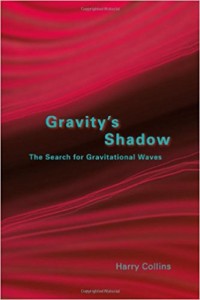 2004: Gravity’s Shadow: The Search for Gravitational Waves University of Chicago Press (870pp)
2004: Gravity’s Shadow: The Search for Gravitational Waves University of Chicago Press (870pp)
A sociological history of the search for gravitational waves from the beginning in the 1950s up to around 2003. The book is part-based on the author’s trusted intense involvement with the field from 1994 onwards along with extensive interviews carried out in the 1970s. The controversy over Joseph Weber’s early findings are dealt with at length as are subsequent disputed claims and the international tensions. The change from small science to big science is extensively covered and the associated traumas are explained.
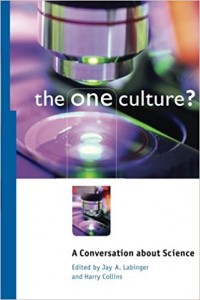 2001: The One Culture? A conversation about science (edited with Jay Labinger) University of Chicago Press (329pp)
2001: The One Culture? A conversation about science (edited with Jay Labinger) University of Chicago Press (329pp)
Presents a three-round debate between those at the frontier of science studies and scientists or `science warriors’. Contributors are Collins, Dear, Gregory & Miller, Lynch, Pinch, and Shapin on the science studies side and, Mermin, Saulson, Sokal & Bricmont, Weinberg and Wilson & Barsky on the other. The arguers mostly come to agree that they had more in common than they thought. This may have been the book that did most to end the `science wars’.
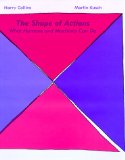 1998: The Shape of Actions: What humans and machines can do (with Martin Kusch) MIT Press (212pp)
1998: The Shape of Actions: What humans and machines can do (with Martin Kusch) MIT Press (212pp)
`Polimorphic’ and `mimeomorphic’ actions are the new names for `regular actions’ and `machine-like actions’ first described in Artificial Experts. In the former there is no mapping between intention and visible behaviour whereas in the latter there is. A complex typology of actions is developed to support the main distinction. Worked examples include writing and the operation of air pumps. The two kinds of action are central to understanding how humans and non-humans relate.
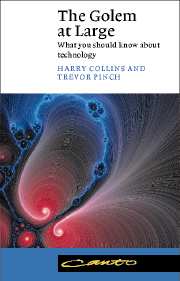 1998: The Golem at Large: What you should know about technology (with Trevor Pinch) Cambridge University Press (163pp)
1998: The Golem at Large: What you should know about technology (with Trevor Pinch) Cambridge University Press (163pp)
The book applies the successful Golem model to technology, covering the success of the Patriot missile, the Challenger explosion, testing of nuclear fuel flasks and safe aviation fuel, the origins of oil, economic forecasting, the dispute about how to limit the effect of Chernobyl on UK sheep farming and the dispute about AIDS treatment in San Francisco. As with the other Golem books, the authors contribute some original chapters and base others on existing material.
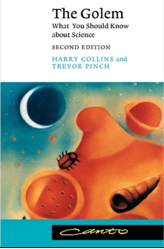 1993/1998: The Golem: What you should know about science (with Trevor Pinch) Cambridge University Press (192pp)
1993/1998: The Golem: What you should know about science (with Trevor Pinch) Cambridge University Press (192pp)
This well-known book featured heavily in the `science wars’, particularly in respect of the chapter on the foundation of the theory of relativity. The debate gave rise to the new Afterword published in the 1998 edition. The seven case studies of scientific controversy cover chemical transfer of memory, relativity (Michelson and Eddington), cold fusion, the germ theory, gravitational waves, the sex life of lizards, and solar neutrinos. There is a forthright Introduction and Conclusion.
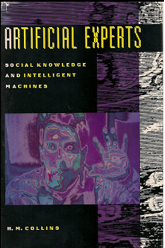
1990: Artificial Experts: Social Knowledge and Intelligent Machines MIT Press (266pp – now print on demand)
A critique of artificial intelligence and expert systems based on SSK (sociology of scientific knowledge). A new question is how, given the social model of knowledge, there can be machines such as pocket calculators. The solution is to introduce `machine-like actions’, where humans try to act like machines. These contrast with `regular actions’ which are dependent on social context. The treatment departs from earlier critiques of AI (eg Dreyfus) in emphasising the social, not embodied, nature of knowledge.
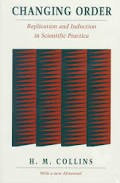 1985/1992: Changing Order: Replication and Induction in Scientific Practice University of Chicago Press (199pp)
1985/1992: Changing Order: Replication and Induction in Scientific Practice University of Chicago Press (199pp)
Papers written in 1974 &1975 mark the start of empirical SSK. The book develops these and introduces the idea of the `experimenter’s regress’ which shows why it impossible to prove a disputed result solely by repeating experiments. The case studies of the TEA-laser and gravitational wave detection are compared with an area of paranormal science. The first two chapters show how the sociological approach is rooted in the problem of induction and offers a `sociological solution’ to it.
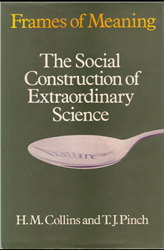 1982: Frames of Meaning: The social construction of extraordinary science (with Trevor Pinch) Routledge (210pp – now print on demand)
1982: Frames of Meaning: The social construction of extraordinary science (with Trevor Pinch) Routledge (210pp – now print on demand)
A study of the investigation of children who claimed to be able to bend spoons paranormally like Uri Geller. The relationship of this `extraordinary’ science to `normal science’ is analysed in terms of the Kuhnian idea of incommensurability. The results of a study of children were reported in Nature and the way this was received, is analysed. Interviews are conducted with scientists and the role of quantum theory in PSI theory is described.


